英语简单句与复合句
【句子结构】高中英语句子成分分析(简单句与复合句)
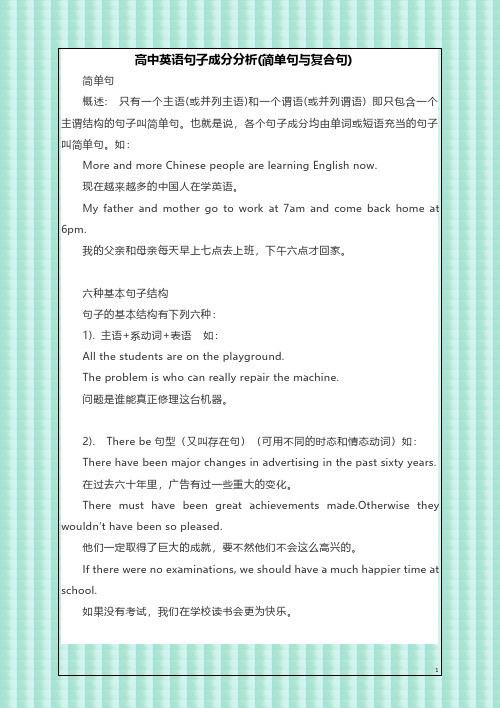
高中英语句子成分分析(简单句与复合句)简单句概述:只有一个主语(或并列主语)和一个谓语(或并列谓语)即只包含一个主谓结构的句子叫简单句。
也就是说,各个句子成分均由单词或短语充当的句子叫简单句。
如:More and more Chinese people are learning English now.现在越来越多的中国人在学英语。
My father and mother go to work at7am and come back home at 6pm.我的父亲和母亲每天早上七点去上班,下午六点才回家。
六种基本句子结构句子的基本结构有下列六种:1).主语+系动词+表语如:All the students are on the playground.The problem is who can really repair the machine.问题是谁能真正修理这台机器。
2).There be句型(又叫存在句)(可用不同的时态和情态动词)如:There have been major changes in advertising in the past sixty years.在过去六十年里,广告有过一些重大的变化。
There must have been great achievements made.Otherwise they wouldn’t have been so pleased.他们一定取得了巨大的成就,要不然他们不会这么高兴的。
If there were no examinations,we should have a much happier time at school.如果没有考试,我们在学校读书会更为快乐。
3).主语+谓语(不及物动词)如:We work hard at English.我们努力学习英语。
He doesn’t work here any longer.他已不在这儿工作了。
英语句子概论简单句与复合句
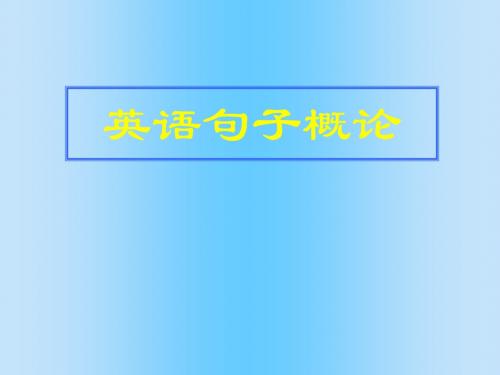
连接成份
连接成份实际上是一个连词,用来连接两个或几个平行的 词、短语和分句。这种连词叫做并列连词。 另一类连接成份是用来连接两个句子、且一个句子从属于 另一个句子(即从句)的连词。这类连词叫从属连词。从 属连词主要用于引导各种从句。 一个完整的句子(主句或从句)必须包含2个到4个基本成 分,此外,如果意思上有需要,还可包含一个或更多其他 的句子成份。
主 主 谓 谓 谓 状(方式) 连 宾 宾 连 宾补 主 连 主 谓 主 谓 地点 谓 宾 表
Frank worked hard I
主
and (he ) became an architect. ’m going to bed.
’ve got a cold, so I
They made him chairman, but (they) didn’t increase his salary.
He is saving up to buy a mobile phone.
A bright little boy with rosy cheeks put three bottles of milk quietly on my doorstep before seven o’clock. He worked like a madman in the garden on Saturday. The young girl with long black hair seems to be very happy.
两个或两个以上限定动词也可合并为一个简单句。 We sang all night. We danced all night. We sang and danced all night.
并 列 句
需把几个意思连接在一起时,可用分号 或把两个或几个简单句用并列连词连接 起来,这种结构即构成一个并列句。
高考英语句子成分:简单句、并列句和复合句(精品资料)

(六)宾语补足语
英语中有些及物动词,除有一个直接宾语 英语中有些及物动词, 以外,还要有一个宾语补语, 以外,还要有一个宾语补语,才能使句子 的意义完整. 的意义完整.带有宾语补足语的一般句型 某些及物动词( 宾语+宾 为:某些及物动词(如make等+宾语 宾 等 宾语 ).宾补可由名词 形容词,副词, 宾补可由名词, 补).宾补可由名词,形容词,副词,不 定式,分词,介词短语和从句充当.例如: 定式,分词,介词短语和从句充当.例如:
高考英语语法
句子成分;简单句, 句子成分;简单句, 并列句和复合句
简单句的五种基本句型
1,主语+系动词 表语:e.g. He is a student. ,主语 系动词 表语: 系动词+表语 2,主语 不及物动词:e.g. We work. 不及物动词: ,主语+不及物动词 3,主语+及物动词 宾语:e.g. ,主语 及物动词+宾语: 及物动词 宾语 Henry bought a dictionary. 4,主语 及物动词 双宾语(间接宾语 直接 及物动词+双宾语 ,主语+及物动词 双宾语(间接宾语+直接 宾语): ):e.g. My father bought me a car. 宾语): 5,主语 及物动词 复合宾语(宾语 宾补): 及物动词+复合宾语 宾补): ,主语+及物动词 复合宾语(宾语+宾补 e.g. Tom made the baby laugh. 注:其他各种句子都可由这一种基本句型扩展, 其他各种句子都可由这一种基本句型扩展, 变化或省略而构成. 变化或省略而构成.
(四)表语
表语用以说明主语的身份,特征和状态, 表语用以说明主语的身份,特征和状态, 它一般位于系动词( 它一般位于系动词(如be, become, get, look, grow, turn, seem等)之后.表语一 等 之后. 般由名词,代词,形容词,分词,数词, 般由名词,代词,形容词,分词,数词, 不定式,动名词,介词短语, 不定式,动名词,介词短语,副词及表语 从句表示.例如: 从句表示.例如:
复合从句

不可省略的连词:
介词后的连词不可省略 引导主语从句和同位语从句的连词不可省 略。 That she was chosen made us very happy. We heard the news that our team had won.
主语从句:作句子主语的从句叫主语从句
What he wants to tell us is not clear. 他要跟我们说什么,还不清楚。 Who will win the match is still unknown. 谁能赢得这场比赛还不得而知。 It is known to us how he became a writer. 我们都知道他是如何成为一名作家的。 Where the English evening will be held has not yet been announced. 英语晚会将在哪里举行,还没有宣布。
注意
当主语是reason时,表语从句要用that引导而不 是because。例如: The reason why he was late was that he missed the train by one minute this morning .
同位语从句:
同位语从句说明其前面的名词的具体内容。 同位语从句通常由that引导,that不可省略。 可用于同位语从句的名词有advice、demand、 doubt、fact、hope、idea、information、 message、news、order、problem、promise、 question、request、suggestion、truth、wish、 word等。 The news that we won the game is exciting. 我们赢得这场比赛的消息令人激动。 I have no idea when he will come back home. 我不知道他什么时候回来。
高考英语语法复习 ---简单句并列句复合句
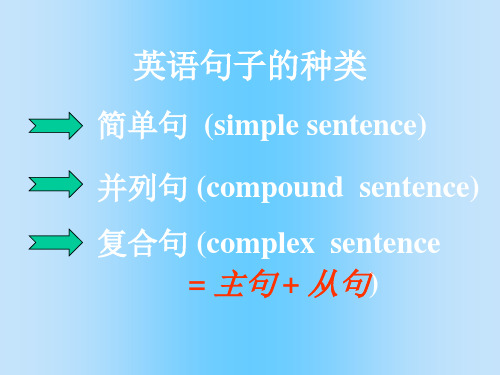
(武汉调研4月) Put yourself in situations where you will be forced to communicate in English, ___ you will see more progress over time. A. or B. so C. yet D. and (崇文4月) You must get up early in the morning, ___ we’ll have to leave without you A.and B. but C. or D. so
英语句子的种类
简单句 (simple sentence) 并列句 (compound sentence)
复合句 (complex sentence = 主句 + 从句)
简单句的五种基本句型
• 主语 + 不及物动词 ( S + Vi ) • 主语 + 及物动词 +宾语 ( S + Vt + O) • 主语 + 系动词 + 表 (S + LV + predicative) • 主语+双宾动词+间宾+直宾(S +Vt +O.indir+O. dir) • 主语 + 宾补动词 +宾语 +宾语补语 • (S + Vt. + O + O. compl) •There + be / stand/ lie / live...
其它平行结构:not…but…, either…or…, neither…nor, not only…but also…, would rather…than…(宁愿……不愿 ……), rather than(而不), as well as(既……也……)等。
英语中句子结构类型
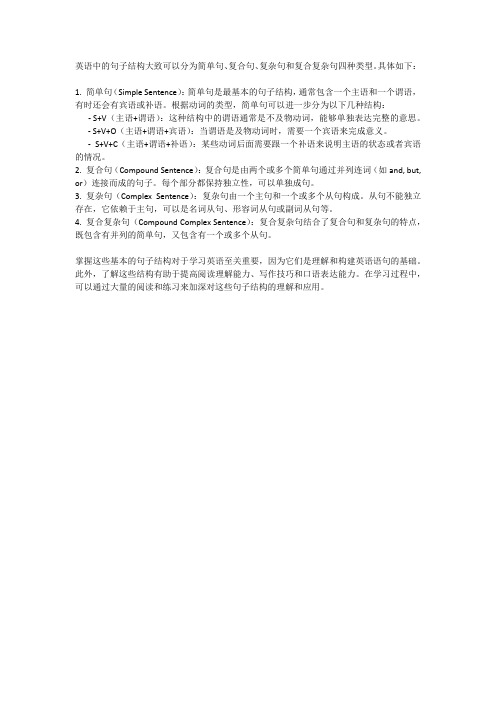
英语中的句子结构大致可以分为简单句、复合句、复杂句和复合复杂句四种类型。
具体如下:
1. 简单句(Simple Sentence):简单句是最基本的句子结构,通常包含一个主语和一个谓语,有时还会有宾语或补语。
根据动词的类型,简单句可以进一步分为以下几种结构:- S+V(主语+谓语):这种结构中的谓语通常是不及物动词,能够单独表达完整的意思。
- S+V+O(主语+谓语+宾语):当谓语是及物动词时,需要一个宾语来完成意义。
-S+V+C(主语+谓语+补语):某些动词后面需要跟一个补语来说明主语的状态或者宾语的情况。
2. 复合句(Compound Sentence):复合句是由两个或多个简单句通过并列连词(如and, but, or)连接而成的句子。
每个部分都保持独立性,可以单独成句。
3. 复杂句(Complex Sentence):复杂句由一个主句和一个或多个从句构成。
从句不能独立存在,它依赖于主句,可以是名词从句、形容词从句或副词从句等。
4. 复合复杂句(Compound Complex Sentence):复合复杂句结合了复合句和复杂句的特点,既包含有并列的简单句,又包含有一个或多个从句。
掌握这些基本的句子结构对于学习英语至关重要,因为它们是理解和构建英语语句的基础。
此外,了解这些结构有助于提高阅读理解能力、写作技巧和口语表达能力。
在学习过程中,可以通过大量的阅读和练习来加深对这些句子结构的理解和应用。
简单句、并列句、复合句
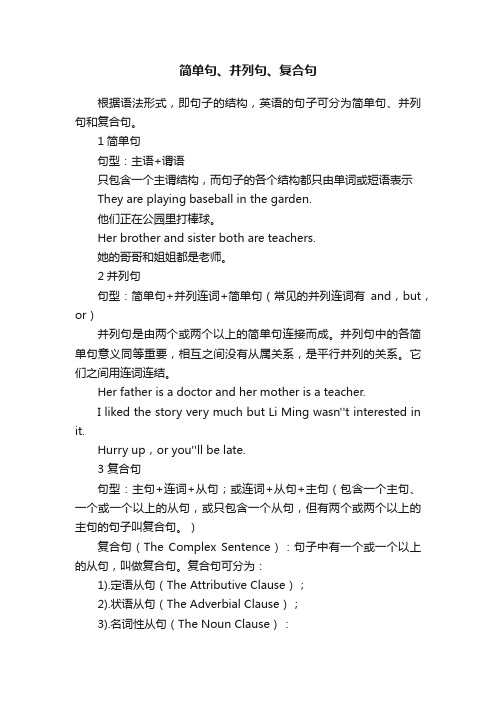
简单句、并列句、复合句根据语法形式,即句子的结构,英语的句子可分为简单句、并列句和复合句。
1简单句句型:主语+谓语只包含一个主谓结构,而句子的各个结构都只由单词或短语表示They are playing baseball in the garden.他们正在公园里打棒球。
Her brother and sister both are teachers.她的哥哥和姐姐都是老师。
2并列句句型:简单句+并列连词+简单句(常见的并列连词有and,but,or)并列句是由两个或两个以上的简单句连接而成。
并列句中的各简单句意义同等重要,相互之间没有从属关系,是平行并列的关系。
它们之间用连词连结。
Her father is a doctor and her mother is a teacher.I liked the story very much but Li Ming wasn''t interested in it.Hurry up,or you''ll be late.3 复合句句型:主句+连词+从句;或连词+从句+主句(包含一个主句、一个或一个以上的从句,或只包含一个从句,但有两个或两个以上的主句的句子叫复合句。
)复合句(The Complex Sentence):句子中有一个或一个以上的从句,叫做复合句。
复合句可分为:1).定语从句(The Attributive Clause);2).状语从句(The Adverbial Clause);3).名词性从句(The Noun Clause):一、定语从句定语从句的定义定语从句在句子中作定语,用来修饰一个名词、名词词组或者代词。
先行词和引导词被修饰的名词、名词词组或代词叫做先行词;在先行词和定语从句之间起连接作用的词叫做引导词。
引导词分为“关系代词”和“关系副词”。
关系代词和关系副词关系代词有:who, whom, whose, that, which, as。
高三英语复习专题——简单句和复合句
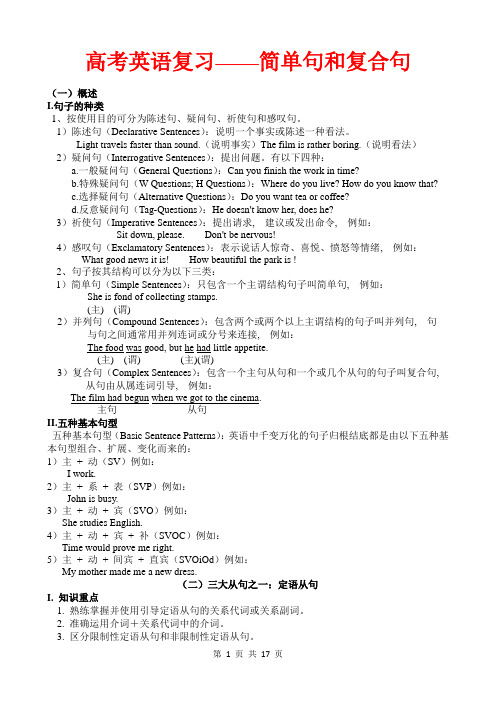
高考英语复习——简单句和复合句(一)概述I.句子的种类1、按使用目的可分为陈述句、疑问句、祈使句和感叹句。
1)陈述句(Declarative Sentences):说明一个事实或陈述一种看法。
Light travels faster than sound.(说明事实)The film is rather boring.(说明看法)2)疑问句(Interrogative Sentences):提出问题。
有以下四种:a.一般疑问句(General Questions):Can you finish the work in time?b.特殊疑问句(W Questions; H Questions):Where do you live? How do you know that?c.选择疑问句(Alternative Questions):Do you want tea or coffee?d.反意疑问句(Tag-Questions):He doesn't know her, does he?3)祈使句(Imperative Sentences):提出请求, 建议或发出命令, 例如:Sit down, please. Don't be nervous!4)感叹句(Exclamatory Sentences):表示说话人惊奇、喜悦、愤怒等情绪, 例如:What good news it is! How beautiful the park is !2、句子按其结构可以分为以下三类:1)简单句(Simple Sentences):只包含一个主谓结构句子叫简单句, 例如:She is fond of collecting stamps.(主) (谓)2)并列句(Compound Sentences):包含两个或两个以上主谓结构的句子叫并列句, 句与句之间通常用并列连词或分号来连接, 例如:The food was good, but he had little appetite.(主) (谓) (主)(谓)3)复合句(Complex Sentences):包含一个主句从句和一个或几个从句的句子叫复合句, 从句由从属连词引导, 例如:The film had begun when we got to the cinema.主句从句II.五种基本句型五种基本句型(Basic Sentence Patterns):英语中千变万化的句子归根结底都是由以下五种基本句型组合、扩展、变化而来的:1)主+ 动(SV)例如:I work.2)主+ 系+ 表(SVP)例如:John is busy.3)主+ 动+ 宾(SVO)例如:She studies English.4)主+ 动+ 宾+ 补(SVOC)例如:Time would prove me right.5)主+ 动+ 间宾+ 直宾(SVOiOd)例如:My mother made me a new dress.(二)三大从句之一:定语从句I. 知识重点1. 熟练掌握并使用引导定语从句的关系代词或关系副词。
英语句子概念

英语句子概念1.什么是英语句子?在英语学习中,句子是非常基础且重要的部分。
句子由一个主语和一个谓语构成,可以是简单句、复合句或复合并列句。
在英语中,句子的基本语序为主语+谓语+宾语。
英语句子的正确结构和使用非常重要,可以影响交流表达的效果和清晰度。
2.简单句简单句是最基础的句型,由一个主语和一个谓语构成。
在许多情况下,简单句也可以包含补语或宾语。
例如:-He runs.-I am happy.-She studies hard.-They ate pizza.3.复合句复合句是由两个或多个简单句组合而成的句子,可以用不同的方式连接。
例如:-I like pizza,but she prefers burgers.(并列句)-She went to the store,where she bought some milk.(从句)-After he finished his homework,he played video games.(时间状语从句)4.句子结构英语句子的结构通常包含主语、谓语、宾语和补语。
主语是句子的主体,谓语描述主语的行为或状态。
宾语是动作的承受者或者受益者,补语用来描述或补充主语或宾语的特性或状态。
例如:-He(主语)ate(谓语)a pizza(宾语).-She(主语)is(谓语)a teacher(补语).-The party(主语)made(谓语)her(宾语)happy(补语).5.句子的类型英语中的句子通常可以分为陈述句、疑问句、祈使句和感叹句。
陈述句是以陈述事实或描述情况为目的的句子。
疑问句是用来提问的句子。
祈使句是用来表达命令、请求或者建议的句子。
感叹句是用来表达强烈情感或感叹的句子。
6.句子的语气英语句子的语气通常可以分为肯定语气和否定语气。
肯定语气表示肯定某种事实或情况,否定语气表示否定某种事实或情况。
通常,肯定语气是以主语+谓语+宾语的形式呈现的,而否定语气则在谓语前加上否定词not。
英语简单句与复合句

简单句和复合句一、简单句简单句就是我们之前学的由五个基本句型构成的句子,包括它们的肯定句,疑问句和否定句。
之前的课程把五个基本句型简化为两个:一个是动作的句型(主语+谓语+宾语),一个是状态的句型(主语+系动词+表语)。
当然,也包括there be句型以及被动句。
其实,我们可以这样理解简单句:由词语或者短语构成各个句子成分的句子。
我们学过的词语常用的有:名词,代词,形容词,动词,介词,副词等等。
常用的短语有:介词短语,动名词短语,动词不定式短语,过去分词短语。
如果一句话,句子成分都由以上的词语或短语构成,那么这个句子就称为简单句。
请看下面的例子:I like English.(我喜欢英语)主语谓语宾语这句话的主语,谓语和宾语都是由词语构成的,代词“I”作主语,动词“like”作谓语,名词“English”作宾语。
I like learning English.(我喜欢学英语)主语谓语宾语这句话的主语,谓语都是由词语构成的,而宾语是由动名词短语“learning English”充当的。
类似于这两句话的句子,都称为简单句。
注意,简单句不一定是简单的,也不一定是很短的。
简单句最重要的要求是由单词和短语构成句子成分。
有时候,英语的短语并不短。
这个之前就特别强调过,所以下面这么长的句子,也属于简单句,因为构成句子成分的都属于单词或短语。
1.A beautiful young tall girl wants to marry a very handsome rich man from Beijing.2.My plan is to buy a beautiful house with a garden and a swimming pool.如果对简单句还不理解,也可以通过下面的表格内容去理解。
了解简单句,就是为了更好地理解下面的复合句。
二、复合句复合句又称主从复合句,由一个主句和一个或一个以上的从句构成,主句为句子的主体,从句不能独立,只用作句子的一个成分,如主语、表语、宾语、介词宾语、定语、同位语、状语(包括地点、条件、时间、原因、让步、比较、结果等状语)。
英语五种基本句型及复合句

第十八页,编辑于星期日:二十三点 九分。
请把每组句子连接为一个含有状语从句复合句。 ❖I’ll give the letter to him .I see him.
(时间状语从句) ❖He didn’t come yesterday .He was ill. (原因状语从句) ❖It is such a big box .Nobody can move it.
第一页,编辑于星期日:二十三点 九分。
英语句子的种类
简单句 (simple sentence) 并列句 (compound sentence)
复合句 (complex sentence)
第二页,编辑于星期日:二十三点 九分。
简单句 (simple sentence)
A.只包含一个主谓结构
Mary opened the door.
(结果状语从句)
❖We’ll go to the great wall .It’s fine
tomorrow. (条件状语从句)
❖We should not go there all the time. The place is quite pleasant.(让步状语从句)
第十九页,编辑于星期日:二十三点 九分。
并列句
➢I bought my sister a present,but
she didn’t like it.
第九页,编辑于星期日:二十三点 九分。
常用并列连词 coordinating conjunctions
• 平行并列连词: and,both…and, not only…
英语简单句与复合句
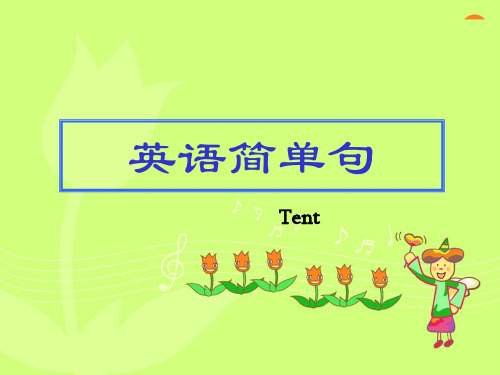
Tent
1.句子的成分
主语:表示句子说的是什么人或什么事, 由名, 代, 数, 不定式, 动名词, 短语或句子充当 位于句首。 谓语:说明主语做什么, 是什么或怎么样 由动词或动词词组充当, 位于主语后。 宾语: 表示动作行为的对象,通常位于及物动词和介词后面。 宾语补足语:补充宾语的成分,通常位于宾语后。由形容词, 名词, 介词短语等充当。 表语:说明主语的性质或特征,位于系动词之后。
英语句子的基本结构可以归纳成五种基本 句型及其扩大、组合、省略或倒装。
掌握这五种基本句型, 是掌握各种英语句 子结构的基础。
18
Q&A
She put the eggs into the basket with great care. 方式状语 She came in with a dictionary in her hand. 伴随状语 In order to catch up with the others, I must work harder. 目的状语 He was so tired that he fell asleep immediately. 结果状语 She works very hard though she is old. 让步状语 I am taller than he is. 比较状语
3.I have seen the film.
4.He gave a pen to me.
5.The boss made the boy work hard.
6.My father bought a book for me.
练习2: 判断下列句子属于何种句型
1. We are sitting on the train back home. 主+谓 2. There comes the bus ! 主+谓 3. The ego’s potential for expansion is limitless.
英语语法专项训练简单句和复合句
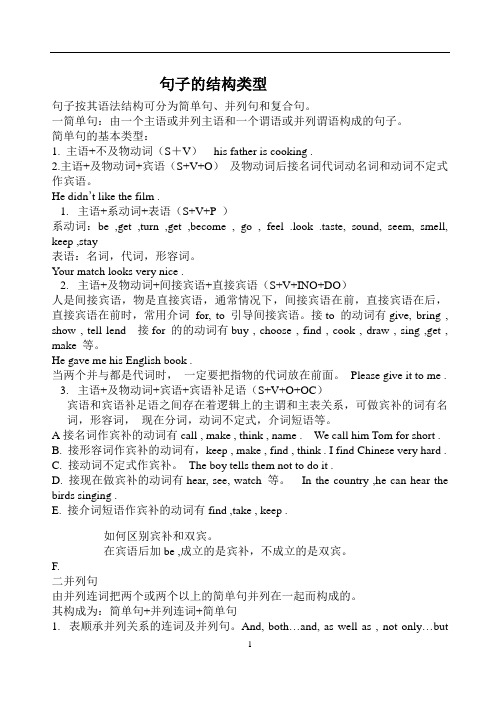
句子的结构类型句子按其语法结构可分为简单句、并列句和复合句。
一简单句:由一个主语或并列主语和一个谓语或并列谓语构成的句子。
简单句的基本类型:1. 主语+不及物动词(S+V)his father is cooking .2.主语+及物动词+宾语(S+V+O)及物动词后接名词代词动名词和动词不定式作宾语。
He didn’t like the film .1.主语+系动词+表语(S+V+P )系动词:be ,get ,turn ,get ,become , go , feel .look .taste, sound, seem, smell, keep ,stay表语:名词,代词,形容词。
Your match looks very nice .2.主语+及物动词+间接宾语+直接宾语(S+V+INO+DO)人是间接宾语,物是直接宾语,通常情况下,间接宾语在前,直接宾语在后,直接宾语在前时,常用介词for, to 引导间接宾语。
接to 的动词有give, bring , show , tell lend 接for 的的动词有buy , choose , find , cook , draw , sing ,get , make 等。
He gave me his English book .当两个并与都是代词时,一定要把指物的代词放在前面。
Please give it to me .3.主语+及物动词+宾语+宾语补足语(S+V+O+OC)宾语和宾语补足语之间存在着逻辑上的主谓和主表关系,可做宾补的词有名词,形容词,现在分词,动词不定式,介词短语等。
A接名词作宾补的动词有call , make , think , name . We call him Tom for short .B. 接形容词作宾补的动词有,keep , make , find , think . I find Chinese very hard .C. 接动词不定式作宾补。
英语基本句型构架
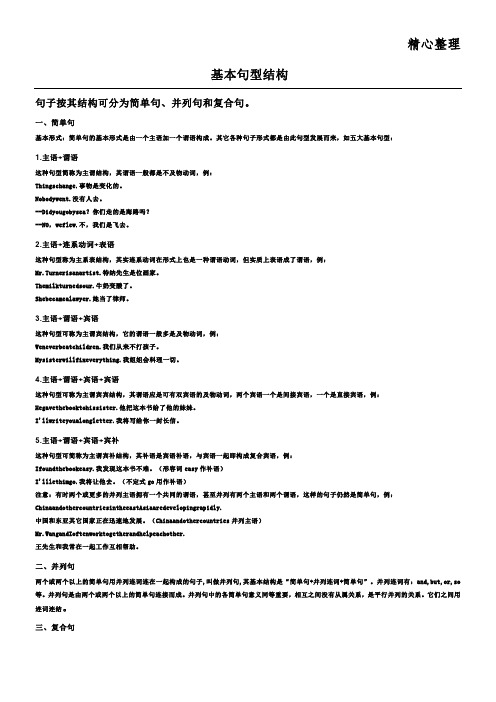
精心整理基本句型结构句子按其结构可分为简单句、并列句和复合句。
一、简单句基本形式:简单句的基本形式是由一个主语加一个谓语构成。
其它各种句子形式都是由此句型发展而来,如五大基本句型:1.主语+谓语这种句型简称为主谓结构,其谓语一般都是不及物动词,例:Thingschange.事物是变化的。
Nobodywent.没有人去。
--Didyougobysea?你们走的是海路吗?--NO,weflew.不,我们是飞去。
2.主语+连系动词+表语这种句型称为主系表结构,其实连系动词在形式上也是一种谓语动词,但实质上表语成了谓语,例:Mr.Turnerisanartist.特纳先生是位画家。
Themilkturnedsour.牛奶变酸了。
Shebecamealawyer.她当了律师。
3.主语+谓语+宾语这种句型可称为主谓宾结构,它的谓语一般多是及物动词,例:Weneverbeatchildren.我们从来不打孩子。
Mysisterwillfixeverything.我姐姐会料理一切。
4.主语+谓语+宾语+宾语这种句型可称为主谓宾宾结构,其谓语应是可有双宾语的及物动词,两个宾语一个是间接宾语,一个是直接宾语,例:Hegavethebooktohissister.他把这本书给了他的妹妹。
I'llwriteyoualongletter.我将写给你一封长信。
5.主语+谓语+宾语+宾补这种句型可简称为主谓宾补结构,其补语是宾语补语,与宾语一起即构成复合宾语,例:Ifoundthebookeasy.我发现这本书不难。
(形容词easy作补语)I'lllethimgo.我将让他去。
(不定式go用作补语)注意:有时两个或更多的并列主语拥有一个共同的谓语,甚至并列有两个主语和两个谓语,这样的句子仍然是简单句,例:ChinaandothercountriesintheeastAsiaaredevelopingrapidly.中国和东亚其它国家正在迅速地发展。
英语句子结构-简单句成分
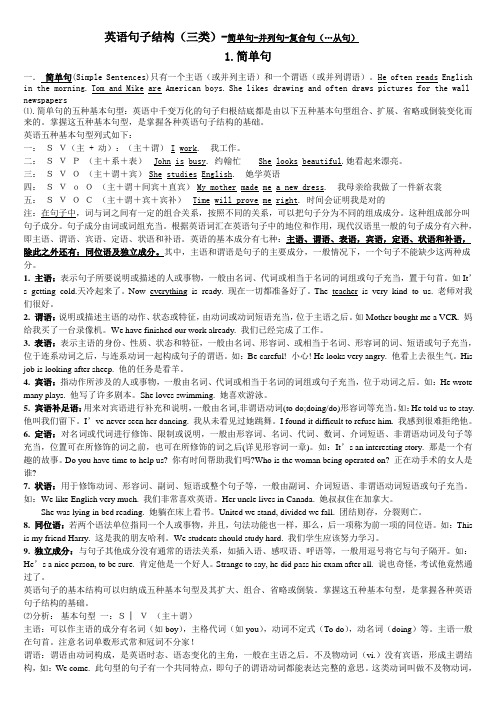
英语句子结构(三类)-简单句-并列句-复合句(…从句)1.简单句一.简单句(Simple Sentences)只有一个主语(或并列主语)和一个谓语(或并列谓语)。
He often reads English in the morning.Tom and Mike are American boys.She likes drawing and often draws pictures for the wall newspapers⑪.简单句的五种基本句型:英语中千变万化的句子归根结底都是由以下五种基本句型组合、扩展、省略或倒装变化而来的。
掌握这五种基本句型,是掌握各种英语句子结构的基础。
英语五种基本句型列式如下:一:SV(主 + 动):(主+谓)-I work. 我工作。
二:SVP(主+系+表)- John is busy. 约翰忙 She looks beautiful.她看起来漂亮。
三:SVO(主+谓+宾)-She studies English. 她学英语四:SVoO(主+谓+间宾+直宾)-My mother made me a new dress. 我母亲给我做了一件新衣裳五:SVOC(主+谓+宾+宾补)- Time will prove me right. 时间会证明我是对的注:在句子中,词与词之间有一定的组合关系,按照不同的关系,可以把句子分为不同的组成成分。
这种组成部分叫句子成分。
句子成分由词或词组充当。
根据英语词汇在英语句子中的地位和作用,现代汉语里一般的句子成分有六种,即主语、谓语、宾语、定语、状语和补语。
英语的基本成分有七种:主语、谓语、表语,宾语,定语、状语和补语,除此之外还有:同位语及独立成分。
其中,主语和谓语是句子的主要成分,一般情况下,一个句子不能缺少这两种成分。
1. 主语:表示句子所要说明或描述的人或事物,一般由名词、代词或相当于名词的词组或句子充当,置于句首。
如It’s getting cold.天冷起来了。
中考英语简单句并列句复合句考点讲解及练习

简单句、并列句和复合句考点一简单句1.简单句只包含一个主谓结构.2.五种简单句:1)主+谓. He comes at last.2)主+系+表. She is a teacher.The soup tastes nice.3)主+谓+宾. They reached the village.4)主+谓+间宾+直宾. He gave me a pen.5)主+谓+宾+宾补. I find that book very useful.考点二并列句并列句:两个或两个以上的简单句,用连词连接起来;常用的连接词有:1.表示顺承关系的:and, not only…but also不仅….而且….等;She ______ gave us a lot of advice, _______ helped us to overcome difficulties.Linda tried to become an excellent teacher, _____ at last she succeeded.2.表示选择关系和否定条件的有or还是,否则Do you want to leave now ____ would you rather set off laterWear your coat, ____ you’ll catch a cold.3.表示转折关系的有but, yet等;He is young, but he works hard.虽然他年轻,但工作努力;4.表示因果关系的有for, so 等;My leg hurts so I go to see a doctor. 我的腿疼,因此我去看医生;考点三主从复合句:宾语从句1.宾语从句的引导词1引导陈述句用 that在口语和非正式文体中常常省略He tells me that he is going shopping this Sunday.2 引导一般疑问句用if或whether.She asked me if\ whether she could join us. whether…or not3 引导特殊疑问句,要用原来的特殊疑问词;She asked them what they were doing.2.宾语从句的语序:要用陈述句语序;I want to know when the train left.3. 宾语从句的时态1主句是一般现在时,一般将来时或祈使句,宾语从句可根据实际需要选用各种时态;He tells us that he has been able to look after himself.(2)主句是过去时态,宾语从句应使用过去时的相应时态;They said that they had already finished the work.(3)如果宾语从句叙述的是客观事实、真理、自然现象等,不管主句用什么时态,从句都用一般现在时;He said that light travels faster than sound.3. 练习1She asked me, “Will you go to the cinema tomorrow”改为含宾语从句的复合句She asked me______ I ______ go to the cinema the next day.2 How lovely the dog is Can you tell me _____A. where did you get itB. where will you get itC. where you got it3 --- Can you tell me _____ your parents at home--- I often wash clothes and sweep the floor.A.how will you helpB. how you helpC. how will you helpD. howdo you help4 When I was young, my grandfather told me that the sun ______ rise in the east.考点四状语从句一、状语从句在复合句中作状语,修饰主句中的动词、形容词、副词等;1.地点状语从句地点状语从句通常由 where 引导;Put all the things _____they were.A. whereB. whenC. whoseD. which2.时间状语从句主句用将来时,从句用一般现在时时间状语从句的引导词有when, before, after, until, as soon as, since, while, as 等She was cooking when someone knock at the door.What will you do after you finished your homework3.条件状语从句在条件状语从句中,常用的引导词有if, unless等;If it dosen’t rain, I” ll go fishing.They will have a picnic unless it rains next Sunday.4.原因状语从句原因状语从句常用的引导词有because, as, since既然等He didn’t come because he was ill.Since we are students, we should study hard.Because 和so 不能在一个句子中同时使用;5. 结果状语从句结果状语从句主要由so…that…, such…that…引导;It’s so hot that we want to go swimming.That’s such an interesting story that everybody likes it.So… that…与简单句之间的句型转换1)that后的句子是否定句,常用too…to进行转换;He is so young that he can’t go to school. he is too young to go to school.2)that后的句子是肯定句;常用enough to 进行转换;The shirt was so cheap that he bought it. the shirt was cheap enough for him to buy.6.目的状语从句目的状语从句常用的引导词有so that, in order that 等 in order to 简单句Please say it in a loud voice so that everyone can hear it.He works harder in order that he can go to a good college.7. 让步状语从句引导词有though, although, even if, even though尽管等;He often helps others though\ although he is not rich.They will stand by you even if you don’t succeed.Though, although与but 不能同时出现在一个句子中8.比较状语从句比较状语从句由than, as…as…, not as\so… as等引导;比较级He is more outgoing than I.He ran as fast as Mike.二、练习1. It’s quite common in Britain to say “thank you”to the drivers _____ people get off the bus.a. afterb. sincec. untild. when2. The art club is for members only. You can’t go in ____you are a member.a. unlessb. becausec. ifd. though3. Now many parents send their children to foreign countries, _____ they want them to get a better education.a. untilb. thoughc. because4. ---- What would some students like to do after finishing their education---- They would like to start to work_______ they needn’t depend on their parents completely.a. as soon asb. so thatc. befored. while考点五定语从句修饰某一名词或代词的从句叫定语从句;被定语从句修饰的词叫先行词,引导定语从句的词叫关系词关系代词和关系副词;1.关系代词的基本用法The man __________spoke at the meeting is from Hong Kong. 指人作主语The building ___________is being built will be used as a hospital.指物作主语I visited a scientist _______ name is known all over the world. 指人作定语2. 关系代词特殊用法1当关系代词在从句中作主语时,从句的谓语动词要与先行词保持一致;He is one of the boys who ______ like playing football.He is the only one of the boys who________ like playing football.2 通常以下四种情况关系代词只能用that而不能用which.1 先行词为all, much, something, everything, nothing, little, none, the one 等不定代词时2先行词被形容词最高级修饰时;3当先行词被the only, the very, the just等修饰时;4先行词中既有人又有物时;3. 关系副词的基本用法;1 when 在句中作状语,表示时间;2 where 在句中作状语,表示地点;.3 why 在句中作状语,表示原因;He remembers the day _______ he joined the League.This is the reason_______ he is late today.This is the place _______ Lu Xun was born.1. 2011泰安--- _______do you read English newspapers---I read China Daily every day.A. How longB. How soonC. How oftenD. How far2.2011抚州John had a short walk after lunch, _______A. did heB. didn't heC. had heD. hadn't he3.2011宁波--- _______do you have an Art Festival in your school---Once a year.A. How longB. How oftenC. How farD. How soon4.2011安徽省If you want to go to see the movie this evening, so _______I.A. doB. amC. willD. should5.2011长沙 _______tall the girl isA. HowB. HowaC. WhatD. What a6.2011长沙 _______ call me Mimi It's my cat's name.A. NotB. Didn'tC. Doesn'tD. Don't7.2011长沙They went to the park yesterday,_______A. don't theyB. didn't theyC. aren't theyD. can't they8.2011福州---Li Mei usually helps others, _______---Yes, she is kind-hearted.A. does sheB. is sheC. doesn't she9.2011眉山There _______an English party in our school tomorrow evening.A. haveB. will haveC. is going to haveD. will be10. 2011济南--- _______a year does your school have sports meetings---Twice a year.A. How oftenB. How soonC. How longD. How many times11. 2011泰州---I have changed my job.---_______.A. So do IB. So have IC. So I doD. So I have12. 2011济南Mike learns a lot about Internet. And _______.A. I don't, eitherB. so do IC. so am I am, too13. 2011眉山Jim never goes to the movies on Saturday, _______A. does JimB. doesn't JimC. doesn't heD. does he14. 2011玉州You've just finished your listening exam Please getyourself ready for the next part, _______A. shall weB. will youC. do youD. are you15. 2011眉山--- _______the weather like last Monday---It was sunny.A. How wasB. What'sC. What wasD. How is16. 2011潍坊_______great scientist Qian Xuesen isA. HowB. HowaC. WhatD. What a17. 2011眉山--- _______do you visit your grandparents---Once a month.A. How soonB. How longC. How muchD. How often18. 2011内江--- _______ do you speak English so well---Because I practice it with my partner every day.A. WhyB. WhenC. Who19. 2011泉州---We'll go to Qing Yuan Mountain tomorrow. Why _______join us---That's a good idea.A. notB. don'tC. can'tD. didn't20. 2011泉州There is little milk in the glass, _______A. is thereB. isn't thereC. isn't itD. does it21. 2011肇庆The students in Class Two played basketball against ClassOne yesterday,_____A. did theyB. didn't theyC. weren't they22. 2011宁波---What a new computer Can you tell me_______---Just the day before yesterday.A. how much you paid for itB. how much did you pay for itC. when you bought itD. when did you buy it23. 2011泰安---Tom wants to know if you will have a picnic tomorrow.---Yes. But if it _______, we'll play chess instead.A. will rainB. rainedC. is rainingD. rains24. 2011烟台---Do you know this dictionary belongs to---Let me see. Oh, it's_______.A. who does; mineB. who; meC. whose; mineD. who; mine25. 2011杭州Franklin told them all _______to be in Britain again.A. he was how happyB. how happy he wasC. how was he happyD. he was happy how26. 2011湖州---What kind of movies do you like---I like the movies_______ are about Chinese history.A. whoB. whomC. whoseD. that27. 2011丽水---Do you know _______---Sorry, I don't have a watch.A. whose watch this isB. whose watch is thisC. what time it isD. what time is it28. 2011重庆The woman asked the policeman where _______.A. the post office isB. the post office wasC. is the post officeD. was the post office29. 2011泰安---Can you guess_______ the new schoolbag yesterday.----Sorry, I've no idea.A. how much did he pay forB. how much he spentC how much he paid for D. how much did he spend30. 2011杭州Who is the man_______ is reading a book over thereA. thatB. whichC. whoseD. what31. 2011湖州---Do you know_______---Next Sunday.A. what they will doB. where they will doC. when they will come hereD. who they will meet32. 2011长沙---Can you tell me why_______---Because I want to help the people there.A. do you go to Tibet西藏B. did you go to TibetC are you going to Tibet D. you are going to Tibet33. 2011浙江省---Linda, could you tell me _______---He is an actor.A. what he doesB. what does he doC where he works D. where does he work34. 2011福州---Could you tell me _______---Sure. The day after tomorrow.A. when will you leave for the U.S.A.B. when Mr. Lee will comeC when your father returned35. 2011济南He asked me_______.A. who did kick the first goal in the World CupB. when was the A. PEC meeting heldC when China became a member of the WTOD. where will the 2008 Olympics be held36. 2011玉州Jane is one of the students in the class _______ have everbeen to China.A. whoB. whoseC. whichD. whom37. 2011济宁Can you tell me _______after this examA. what you didB. what did you doC. what will you doD. what you will do38. 2011苏州---Can you tell me how many colours _______ in a rainbow---SevenA. there areB. are thereC. they areD. are they39. 2011潍坊I can't understand _______Apple's iPad 2.A. why are they so mad aboutB. why they are so mad aboutC. how are they so mad aboutD. how they are so mad a。
英语简单句与复合句

His rapid progress in English made us surprised(. 代词)
Our monitor is always the first to enter the classroom.
(不定式)
The teaching plan for next term has been worked out.
afternoon. 简单句
复合句
2. The boy who offered me his seat is called Tom.
3. There is a chair in this room. 简单句
4. My brother and I go to school at half past seven in the morning and come back home at seven in the evening. 简单句
状语种类如下: How about meeting again at six?(时间状语) Last night she didn’t go to the dance party because of the rain.(原因状语) I shall go there if it doesn’t rain.(条件状语) Mr Smith lives on the third floor.(地点状语)
(动名词)
He is reading
an
article
about
how
to
learn
English.
Tom is a boy who likes music very much. (介词短语)
(从句)
状语:修饰动词、形容词、副词或整个句子, 说明动作或状态特征的句子成分,叫做状语。 通常由副词,介词短语和从句充当。
- 1、下载文档前请自行甄别文档内容的完整性,平台不提供额外的编辑、内容补充、找答案等附加服务。
- 2、"仅部分预览"的文档,不可在线预览部分如存在完整性等问题,可反馈申请退款(可完整预览的文档不适用该条件!)。
- 3、如文档侵犯您的权益,请联系客服反馈,我们会尽快为您处理(人工客服工作时间:9:00-18:30)。
Tent
1. 句子的成分
主语:表示句子说的是什么人或什么事, 由名,代,数,不定式,动名词,短语或句子充当 位于句首。 谓语:说明主语做什么,是什么或怎么样 由动词或动词词组充当, 位于主语后。 宾语: 表示动作行为的对象,通常位于及物动词和介词后面。 宾语补足语:补充宾语的成分,通常位于宾语后。由形容词,名词 ,介词短语等充当。 表语:说明主语的性质或特征,位于系动词之后。
由并列连词
1. He likes eggs, but he
并 (and,so,but, or等) doesn’t like chickens.
列 把两个或两个以上的
句 简单句连在一起而构 2. Work hard or you will fall
成的句子。
behind.
复 由一个主句和一个或 1. I believe you are right.
3. There is a chair in this room. 简单句
4. My brother and I go to school at half past seven in the morning and come back home at seven in the evening. 简单句
She put the eggs into the basket with great care. 方式状语 She came in with a dictionary in her hand. 伴随状语 In order to catch up with the others, I must work harder.
合 一个以上的从句构成 2. If you study harder, you will
句 的句子
pass the exam.
判断下列句子是简单句、并列句还是复合句:
1. We often study Chinese history on Friday
afternoon. 简单句
复合句
2. The boy who offered me his seat is called Tom.
(从句)
状语:修饰动词、形容词、副词或整个句子, 说明动作或状态特征的句子成分,叫做状语。 通常由副词,介词短语和从句充当。
状语种类如下: How about meeting again at six?(时间状语) Last night she didn’t go to the dance party because of the rain.(原因状语) I shall go there if it doesn’t rain.(条件状语) Mr Smith lives on the third floor.(地点状语)
目的状语
He was so tired that he fell asleep immediately. 结果状语 She works very hard though she is old. 让步状语 I am taller than he is. 比较状语
同位语: 对其前面的名词代词做进一步解释. That is Mr. Chen, our English teacher.
以上的成分称为基本句子成分。完整的句子一般 至少包含2-4个基本成分。
定语:修饰名词或代词的词、短语或从句称为定语
定语可由以下等成分表示:
Guilin is a beautiful city. (形容词)
China is a developing country; (分词) America is a developed country. There are thirty women teachers is our school.(名词) His rapid progress in English made us surprised(. 代词)
Our monitor is always the first to enter the classroom.
(不定式)
The teaching plan for next term has been worked out.
(动名词)
He is reading an article about how to learn English. Tom is a boy who likes music very much. (介词短语)
插入语: 对一句话作一些附加的解释. To be honest, I don’t quite agree with you.
定语,状语,同位语及插入语可以称为 附属句子成分。
2.句子的分类
分类
说明
由一个主语或并列主 简 语和一个谓语或并列 单 谓语构成的句子。即 句 一套主谓关系。
例句
1. Tom and I found her there. 2. We all breathe, eat and work.
练习答案及解析:
• Lucy sings every day.
主+谓
• Lucy sings the same song every day.
主+谓+宾
•
Lucy sang me a song yesterday evening.
双宾语
主+谓+间 宾+直宾
(=Lucy sang a song for me yesterday evening.)
•
I
heard
Lucy
singing
yesterday evening.
宾语补足语
主+谓+宾+ 宾补
• Lucy is a good singer. 主+系+表
3. 简单句的基本句型
例句:理解各句意思并标记出主语、谓语和宾语 • Lucy sings every day. • Lucy sings the same song every day. • Lucy sang me a song yesterday evening.
(= Lucy sang a song for me yesterday evening.) • I heard Lucy singing yesterday evening. • Lucy is a good singer.
